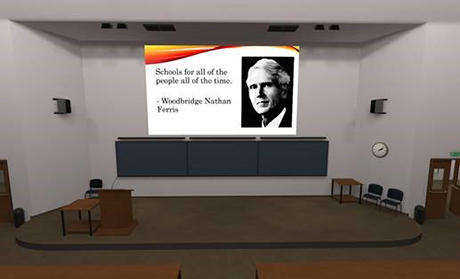 Research is underway on the Ferris State University campus into the development of
standards and best practices for presenting classes and coursework in Virtual Reality.
A $7,500 Exceptional Merit Grant from The Ferris Foundation has been awarded to this
effort.
Research is underway on the Ferris State University campus into the development of
standards and best practices for presenting classes and coursework in Virtual Reality.
A $7,500 Exceptional Merit Grant from The Ferris Foundation has been awarded to this
effort.An Exceptional Merit Grant awarded by The Ferris Foundation will support research on campus this summer and fall to develop standards and best practices for instructors who seek to build courses for, or move their current face-to-face course to, Virtual Reality (VR).
Hira Herrington, a Computer Information Systems assistant professor, has formed an ad hoc research committee for this pursuit, composed of College of Business and Office of Extended and International Operations faculty and staff.
“Currently, there are few guidelines for educators to follow if they wish to move their current face-to-face course to, or develop a new course for, VR,” Herrington said. “As an educational institution, Ferris is in a unique position to be a leader in courses delivered in this fashion.”
The research committee has received approval from Ferris’ Institutional Review Board to have Ferris students evaluate classes delivered in VR. The College of Business has provided a first-floor room in its building to be used as a laboratory for VR research.
“The Ferris Foundation grant allows us to acquire the hardware, computers and VR headsets necessary to begin the first phase of our research,” said Herrington. “Other institutions around the country are already involved in or beginning VR research. Our timing, in terms of being able to capitalize on this emerging technology, is excellent. Our near-term goal is to publish the findings from our research. The long-term goal is to use the outcomes from our research to train Ferris faculty to deliver classes and courses in VR.”
According to Herrington, the $7,500 received from The Ferris Foundation provided the financial start needed for the first phase of the project. Additional grants from outside of Ferris will be sought to continue research and purchase new hardware, as the technology advances. These funds will also be used to acquire additional hardware that can be used to establish dedicated spaces around campus to deliver VR classes.
“We also hope to also purchase hardware that can be used by recruiters to allow prospective students to experience Ferris VR first hand,” said Herrington. “If all aspects of this effort advance steadily, our first experimental VR courses could be offered as soon as the 2020 Spring semester, with our first training sessions for Ferris faculty who wish to move their current face-to-face courses to VR offered in the summer of 2020.”
The professor added that the sheer number of institutions offering online courses and degrees has “homogenized the online educational market.”
“Other institutions in our state and around the country are or will be offering their first VR courses soon,” Herrington said. I believe Ferris being one of the first to offer VR courses will give us brand distinctiveness and allow us to be known as a leader in the use of technology for instructional purposes.”
The Nielsen Company estimates that there are 46.4 million video game consoles owned by 18 to 34-year-olds in the US. Many of today’s games utilize 3D and VR to bring added realism to the experience, and Herrington said they need to develop understanding and familiarity with instructors, more than the prospective student.
“The world of video games has created a ready-made market for VR courses,” Herrington said. “This research will allow Ferris to take its courses to where students are already adapted and comfortable.”
The Ferris Foundation Board of Directors followed the recommendation of their Grants
and Gifts Committee and approved a total of seven grant awards, which totaled $42,197.22.
PHOTO CAPTION: Research is underway on the Ferris State University campus into the development of standards and best practices for presenting classes and coursework in Virtual Reality. A $7,500 Exceptional Merit Grant from The Ferris Foundation has been awarded to this effort.

